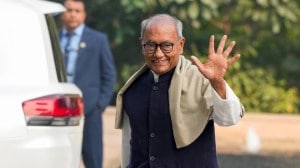Getting wires crossed
How roles reversed in the two parliamentary committees that took up the 2G spectrum scam,and how the draft report of each differed from the other in its findings
How roles reversed in the two parliamentary committees that took up the 2G spectrum scam,and how the draft report of each differed from the other in its findings
PAC draft says8230;
8216;The PMO was very much aware of the law minister8217;s suggestions,but the counter-view of the Communications amp; IT minister got overriding preference to the law ministers views
JPC draft says8230;
8216;The assurance given by the communications amp; IT minister in his correspondence with the Prime Minister to maintain full transparency in following established rules and procedures stood belied8217;
In 2011,the Lok Sabha Speaker received two separate submissions from members of the Parliamentary Accounts Committee going into the 2G spectrum allocation scam. One was from the PACs chairman,Murali Manohar Joshi of the BJP,who submitted the draft report of his panel. The other was from 11 of the panels 21 members,who submitted a resolution rejecting Joshis draft report. These 11 comprised seven members of the Congress,two of the DMK and one each of the Samajwadi Party and the BSP.
Last month,the roles reversed in the Joint Parliamentary Committee under Congress Lok Sabha member P C Chacko. When he circulated his draft report,15 of the 30 JPC members rejected it. These included two DMK and one Trinamool Congress members,who had joined hands with the opposition. The 15 wrote to the Speaker that they had no confidence in Chacko and urged her to name a replacement. She suggested that they sort it out in the committee as the rules did not provide for the removal of the chairman.
Dramatic developments had marked the April 28,2011,meeting in which the 11 PAC members had rejected Joshi8217;s draft report. The report had made some critical references to Prime Minister Manmohan Singh,the PMO,then finance minister P Chidambaram and then telecom minister A Raja. Joshi heard them out during the pre-lunch sitting,but walked out in a huff minutes into the post-lunch session. He told the media that he had adjourned the meeting because he had not been allowed to speak. Saifuddin Soz of the Congress,however,claimed that the 11 members had elected him chairman for todays meeting,which had then continued. The 11 members passed their resolution,moved by Tiruchi Siva of the DMK,and sent it to the Speaker,who also received Joshis draft and returned it after a few weeks.
The PAC was constituted afresh in May and Joshi tried to keep the draft report alive as the unfinished agenda of the previous committee. It has been gathering dust since then.
Chackos draft too remains on the shelf. Unsure of the support of one member,who belongs to the SP,and fearing he will be voted out,Chacko has not convened another meeting since calling off one on April 25.
A look at variations between the findings of the two draft reports:
PAC findings
8216;PMO either failed or was mute8217;
The PAC notes,In his letter dated December 26,2007,the minister for communications amp; IT A Raja had apprised the Prime Minister that his discussion with the external affairs minister and the solicitor general had enlightened him to take a preemptive and proactive decision on the issue of UAS licences/2G spectrum8230; But a perusal of the then external affairs ministers note to the Prime Minister reveals that he has underlined the responsibility of the government to frame,revise and change the policy in a transparent manner and then follow it8230; He has also categorically remarked that while keeping on issuing new licences,the criteria for grant of the licences may be strengthened and put in public domain at the earliest. Thus,it is evident that he did not give any wrong advice to the minister for communications who in turn distorted the facts while writing to the Prime Minister. Similarly,the attorney general has clarified in a written note that he has never verbally or in writing concurred with any proposed course as claimed by A Raja8230; The PMOs reply that no suggestion of the law minister to set up an EGoM was received by them does not convince the committee in view of the fact that the communications minister himself apprised the Prime Minister of the law ministers view along with his own8230; It implies that the PMO was very much aware of the law ministers suggestions,but the counter-view of the communications minister got overriding preference to the law ministers views8230; No effort was made by the PMO to initiate the process of the constitution of the EGoM8230; The PMO certainly either failed to see the forebodings or was rendered a mute spectator.
It adds,The committee are startled to observe the manner in which the then minister of communication amp; information technology succeeded in8230; excluding the matter of spectrum pricing from the purview of Ministry of Finance and leaving it solely to the Department of Telecommunications to decide. In the considered view of the committee such a decision overriding the cabinet decision of October 2003 ultimately facilitated the successor minister of comunications dubious decision leading to the 2G scam. The committee are shocked that the modification in the cabinet decision8230; was never brought before the cabinet even for ex-post-facto approval8230;. The cabinet secretary and the PMO knew about these developments but did not take corrective action.
JPC findings
Prime Minister was misled
The government,while conceding the oppositions demand for a JPC,extended the scope of the probe to the pricing and allocation of spectrum from 1998 to 2008. Consequently,the JPC flagged the loss of revenue caused by a migration package that had been allowed to operators by the NDA regime. The migration package flowed from a cabinet decision dated March 26,1999,which aimed at bringing a uniform policy by doing away with the earlier fixed-licence-fee regime. The JPC pointed out that the move had eben initiated by a caretaker government following dissolution of Parliament.
The committee have,however,been informed that impact on licence fee and spectrum charges collection due to the migration package was to the tune of Rs 43,523.92 crore,which included the sum of revenue i.e. Rs 1,443.58 crore foregone on account of extension of effective date of licence by six months, the JPC says. Outmanoeuvred by the Congress on this count,the BJP chose to reject the draft report of the JPC,alleging that it was intended to tarnish the image of Atal Behari Vajpayee.
On the current Prime Minister,the JPC draft report says,The committee are inclined to conclude that the Prime Minister was misled about the procedure decided to be followed by the Department of Telecommunications in respect of issuance of UAS licences. Further,the assurance given by the minister of communications and information technology in all his correspondence with the Prime Minister to maintain full transparency in following established rules and procedures of the department stood belied.
On the CAG,which triggered the entire 2G controversy with its presumptive loss calculations between Rs 67,364 and 1,76,645 crore,the JPC says,From the foregoing,the very concept of calculation of presumptive loss in the context of allocation of licences and spectrum in a CAG report is misleading8230; In the backdrop of the disrepute caused to the nation on account of projection of such astronomical figures in the audit report pitching the country among the most corrupt nations,the committee in hindsight could only wish that the figures projected in the report could have been more realistic deriving out of proven facts8230; In a democratic framework,every organ of the government is expected to exercise maximum caution and restraint not to trespass the boundaries already drawn up8230; The committee would,therefore,like to uphold the prerogative of the government in a welfare state to formulate policies which should under no circumstance be subjected to audit or calculation of loss.
- 01
- 02
- 03
- 04
- 05































